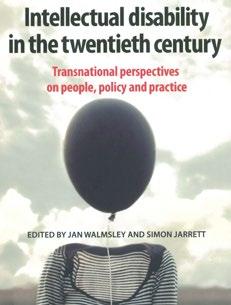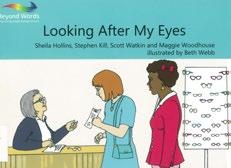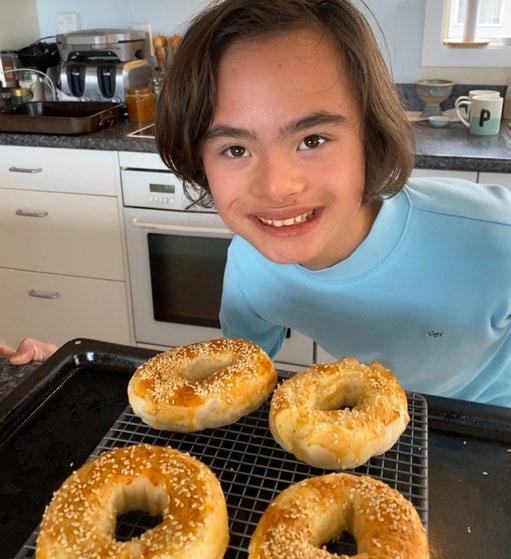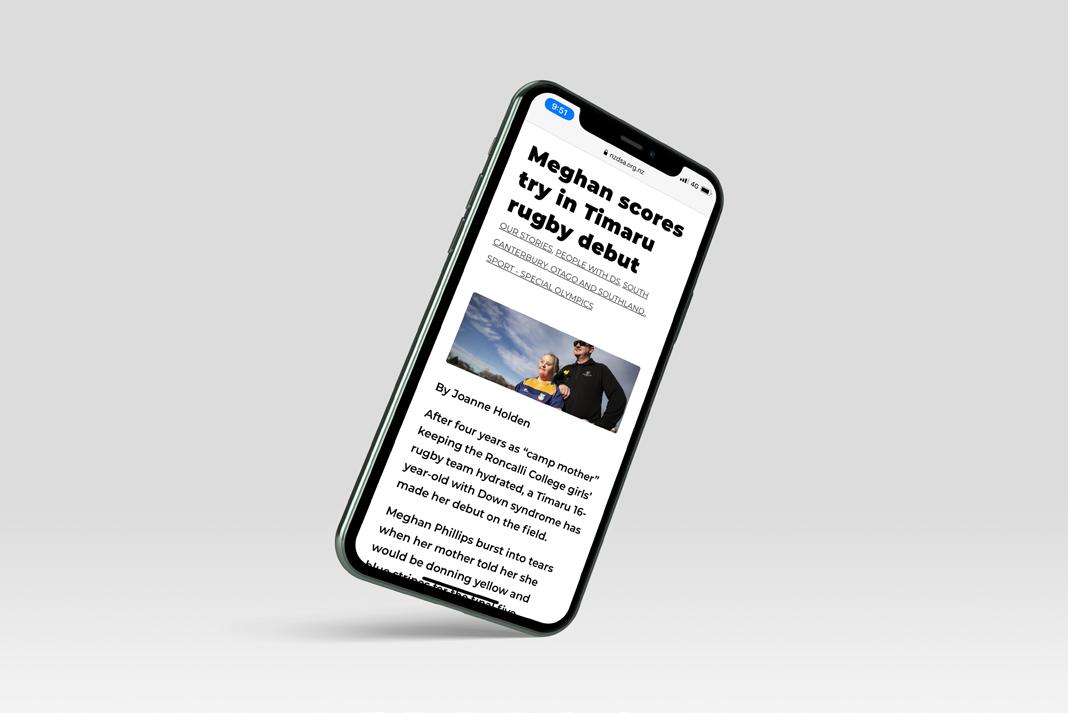
11 minute read
IMPORTANT HEALTH RELATED ISSUES FOR FAMILIES TO CONSIDER
Health
IMPORTANT HEALTH RELATED ISSUES FOR FAMILIES TO CONSIDER
Linda te Kaat of the NZDSA attended the New South Wales Down syndrome Health Conference. In the second part of reporting from the conference, we cover dementia, relationships with your GP and Atlanto-Axial Instability.
Dementia is an increasingly important issue in the Down syndrome community and the Health Conference in Sydney dedicated a special session to dementia The session started with a mother speaking of her 45-year-old daughter’s journey with dementia. As her daughter flatted for 15 years, the early signs were not picked up, but she got quieter and did not participate as much as she usually did. She then had a seizure out of the blue and this was the beginning of the journey. In Australia, just like New Zealand, there are few care options for people under 65 years of age. There are many causes of dementia and it is usually progressive and irreversible with declines in thinking, memory and functional skills. There are two categories for ages, younger is under 65 and older is 65+ years. Any decline before 40 years of age usually would not be dementia, but more likely to be a medical problem and always requires thorough medical investigation. Types of dementia include Alzheimer's disease, frontotemporal, Lewy body, vascular, and other.
How common is dementia in Down syndrome?
AGE
<40
50s
60s
>65 RATE
<10%
30%
50%
80%
But where do you start if anyone starts showing dementia symptoms? Visit the GP and make sure they consider other reasons first like physical health, depression, sensory, thyroid issues, vitamin and mineral deficiencies, environmental stressors and mediation reactions. Make sure you track changes by using the Dementia Screening Questionnaire for Individuals with Intellectual Disabilities (DSQUIID) assessment of skills and clinical review. The next step is breaking the news to the person with Down syndrome, family and carers, and
start planning for changes. Focus on preserving and supporting skills, home modifications, risk assessments and general overall health. Start working towards transitions. You will need support so carers and staff can prepare, discuss options and preferences. Make sure you maximise the quality of life through a healthy lifestyle, stay active and engaged which all help to address physical health, sleep problems and depression. Also start looking at aides and make memory boxes and communication books. Addressing related symptoms is very important as behavioural changes are common in dementia. It is important to manage environmental changes and medications. Seizures can be common and require medication to control. Unfortunately, the diagnosis can be a lengthy process taking between 12-24 months from suspecting someone has dementia until it is confirmed.
The key points from this session were: • Healthy lifestyle and engagement. • Regular health checks. • Establish baseline function & track changes from the age of 30. • Lengthy diagnosis time – investigate changes early. • Plan transitions early. • Get carers support. • Medications may help. • Use all available resources.
A good relationship with your GP
The conference also ran a good session about how to create a strong relationship with your GP. The vital first step is to find a GP that will commit to you and provide continuity of care, rather than going to a health centre and seeing a different GP every time. If necessary, interview several GPs to get the right fit for you and your family. Never be afraid to change GPs either. If you have more than one thing to discuss then plan for a longer appointment by making a double one. Also don’t forget that if required, you can ask the GP to make a home visit. When you have issues to discuss, then the young person does not necessarily need to go with you. Your GP is trained for whole-person care, but may need to direct you to specialist care when required. GPs are generalists and may not have a lot of experience with people with Down syndrome, so educate your GP. Explain. how to approach your young one or communicate effectively with them to get the best information. Medical institutions are not all great at keeping good record, so keep a file with all GP visits and information, so you can dig it out if required.
Atlanto-Axial Instability (AAI) – Neck instability
People with Down syndrome often have low muscle tone and lax ligaments which stabilise the joints, so this can also affect the complex set of joints between the head and upper neck vertebrae. One of the functions of the vertebrae in the spine is to protect the spinal cord and nerves which run from the base of the brain to the pelvis. The main concern about AAI is that this increases the risk of spinal cord damage. The greatest potential for excess movement of one vertebra on another and possible misalignment is at the top of the spinal column at the atlanto-axial joint. This joint lies between the top vertebra (atlas or C1) which supports the base of the skull, and the second vertebra (axis or C2). There is movement at these joints whenever you move your head. Parents, caregivers or people with Down syndrome should be aware of the warning signs and symptoms below and should seek medical advice as soon as possible.
Important symptoms of AAI: • Inability to turn the head laterally or poor neck control. • Pain at the base of the skull. • Change of gait. • Tired, supporting head with the hands. • Loss of first bladder/bowel control. • Tightness in the muscles. • Inability to manipulate things with their hands.
My friend has Down syndrome by Kaitlyn Duling
"In My Friend Has Down Syndrome, beginning readers are introduced to different characters w h o h a v e D o w n syndrome, how Down syndrome may affect their actions, and how we can be good friends to people who have Down syndrome. Vibrant, full-colour photos and carefully levelled text engage young readers as they discover how to be empathetic and include all kinds of friends." - PUBLISHER'S WEBSITE
On the Internet: Our First Talk About Online Safety introduces children to the basics of online safety in a story-based, conversational style. Using real-world examples set within the context of a child who is using the Internet for the first time and watching an older sibling interact with social media, Dr. Roberts takes readers through several common scenarios around parental supervision, online bullying and anonymity. She also includes examples of people who use the Internet to make the world a better place. 'On the Internet' addresses common safety concerns in a child-centred way and offers easy-to-understand rationales as to why it's important to maintain boundaries online just as in real life. The World Around Us series introduces children to complex cultural, social and environmental issues that they may encounter outside their homes, in an accessible way. Sidebars offer further reading for older children or care providers who have bigger questions. For younger children just starting to make these observations, the simple question-and-answer format of the main text will provide a foundation of knowledge on the subject matter.
Intellectual disability in the twentieth century: transnational perspectives on people, policy and practice Edited by Jan Walmsley and Simon Jarrett.
"With contributions f ro m d i st i n g u i s h e d authors in 14 countries across five continents, this book provides a unique transnational perspective on intellectual disability in the 20th century. Each chapter outlines different policies and practices, and details real-life accounts from those living with intellectual disabilities to illustrate their impact of policies and practices on these people and their families." - Publisher's website.


Looking after my eyes by Sheila Hollins
We all need to look after our eyes. This book shows Jade and Mac getting their eyes tested and explains what happens afterwards. Jade is given glasses to help her see better, and Mac has to have an operation. Their feelings about what happens to them, and how things are explained to them so they can give informed consent, are addressed. Fiona also has sight problems and uses a cane to get around safely, and a magnifying glass to read. This book can be used to prepare someone before having as eye test, hospital visit or operation. It can also be used to help someone to understand the adaptations that are available for people with sight problems. It is an invaluable communication tool for eye care professionals during consultations and before treatments Please contact your library team (Phil, Ros, Ann and Michael) on 0800 442 442, email them at librarian@ihc.org.nz or visit the online catalogue at https://ihc.mykoha.co.nz/ You can watch their library video at https://www. youtube.com/watch?v=AunmBYTIZTM
Youth Development Camp
Whilst things might still be uncertain, we are hopeful that the 2020 Youth Development Camp will still be hosted from Friday the 27th November until Sunday the 29th November 2020 at Vaughan Park Retreat Centre, Long Bay, Auckland. This year the NZDSA National Committee has indicated that the 2020 camp will be for either a youth or young adult who has higher support needs to attend with a parent or primary carer, or a youth or young adult who has struggled during Lockdown who can attend with a parent or primary carer, or a youth or young adult who is independent, can self-manage and does not have additional support needs and would not require a parent or primary carer to attend with them. Please note that we have limited places on offer, so please email Linda on nzdsai@xtra.co.nz by the 27 July 2020 to register your interest.
Rose Award
You will note that no one was nominated for a Rose Award in this edition of CHAT 21. So, I would like to encourage you to nominate a deserving individual or organisation for the next edition of CHAT 21. The Rose Award provides the opportunity to thank individuals or organisations who either support individuals with Down syndrome or the Down syndrome community. Please email Linda at nzdsai@xtra.co.nz your nominations for an individual, family, or organisation explaining what they have done to “promote the participation of people with Down syndrome in their community”. We will acknowledge the person in CHAT 21 and will post them a letter outlining why they were selected and include a box of Rose’s chocolates.
Top 10 Maths Applications
The NZDSA would like to know your favourite apps for maths. Please email your list to Jess at hello@nzdsa.org.nz
NZDSA Annual AGM:
Date – 30 October 2020 Time: 5.30pm for a meet and greet with tea and coffee. AGM will start at 6pm Venue: Mercure Abel Tasman Hotel 169 Willis Street, Wellington. Dinner to follow at Bistro 169 at your own expense. Everyone welcome. RSVP to nzdsai@xtra.co.nz by 20 October 2020 if attending so dinner reservations can be made.
The NZDSA is calling for nominations for the NZDSA 2020 National Achievement Awards
These awards recognise the accomplishments of people with Down syndrome during 2019. If you would like to know how to nominate a person please email Linda te Kaat before August 31, 2020 at nzdsai@xtra.co.nz.
Thanks
Thanks to the following funders and sponsors who have made donations to the NZDSA this financial year: • Joyce Fisher Charitable Trust • Lottery Minister’s Discretionary Fund • NZ Lottery Grants Board • Holdsworth Charitable Trust • Thomas George Macarthy Trust • Pub Charity • Southern Stars • Downlights NZ • Enable NZ - Mana Whaikaha • COGS Christchurch • COGS Hamilton • COGS Manukau • COGS Manawatū/Horowhēnua • COGS Otago • COGS Whangārei • COGS North Shore • COGS Wellington • COGS Southland • Page Charitable Trust
The NZDSA has a Facebook page that serves as a community forum and notice board for relevant issues, events and stories. Please check it out at facebook.com/NZDSA
NZDSA Committee
NZDSA Staff
Regional Liaison Officers
Kim Porthouse President Wellington & Wairarapa 021 297 0298 president@nzdsa.org.nz
Gwen Matchitt Vice President Zone 2 Representative Waikato, BOP & Taranaki 0800 693 724 press 3 zone2@nzdsa.org.nz
Angelique van der Velden Zone 5 Representative Ashburton & all areas above 0800 693 724 press 2 zone5@nzdsa.org.nz
Zandra Vaccarino National Executive Officer 0800 693 724 ext. 1 neo@nzdsa.org.nz
Daniel te Kaat Graphic Designer 021 22 333 93 daniel@slaughterhaus.co.nz
Auckland Community Liaison Officer 0800 693 724 press 3 clo@adsa.org.nz Bev Smith Zone 1 Representative Northland 0800 693 724 press 3 northland@nzdsa.org.nz
Zone 3 Representative Whanganui, Manawatū, Gisborne & Hawkes Bay 0800 693 724 press 3 zone3@nzdsa.org.nz
Averill Glew Zone 6 Representative All areas below Ashburton 0800 693 724 press 3 zone6@nzdsa.org.nz
Linda te Kaat National Administrator 0800 693 724 ext. 2 nzdsai@xtra.co.nz
Jess Waters Social Media and Information Officer 021 032 8539 hello@nzdsa.org.nz
Donna Higgs-Herrick Canterbury Community Liaison Officer 0800 693 724 press 3 cdsainc@gmail.com
NZDSA Membership
Membership is now done online. For all details please go to www.nzdsa.org.nz or for any queries please ring 0800 693 724 ext. 2. If you have not received an email to update your membership online please call the number above.
Donations
The NZDSA receives no Government funding and relies solely on donations and grant applications to keep us running. If you can make a donation big or small, please go to www.nzdsa.org.nz or ring 0800 693 724 ext. 2
Diane Burnett Zone 1 Representative Auckland 0800 693 724 press 3 auckland@nzdsa.org.nz
Bridie Allen Zone 4 Representative Wellington & Wairarapa 0800 693 724 press 3 zone4@nzdsa.org.nz
Shelley Waters Treasurer treasurer@nzdsa.org.nz
Coen Lammers CHAT 21 Editor 027 730 239 editor@nzdsa.org.nz
New Zealand Down Syndrome Association PO Box 4142, Shortland Street Auckland, 1140 0800 693 724
Sandra Slattery Taranaki Community Liaison Officer 0800 693 724 press 3 taranakidownsyndrome@gmail.com










